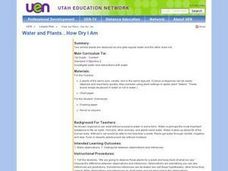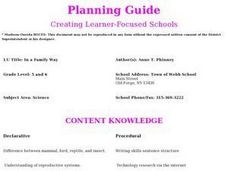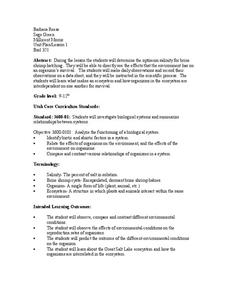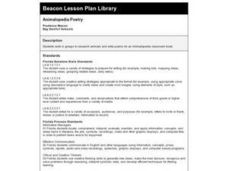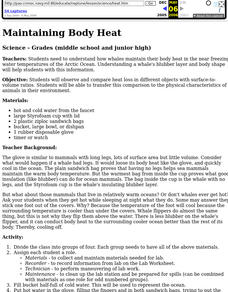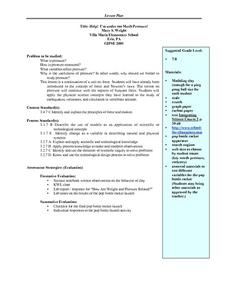Curated OER
DID YOU HELP CREATE THIS
Students examine whether their actions are positively or negatively affecting organisms and their habitats. They choose an animal to study then create a multimedia presentation including charts and graphs of data logger information and...
Curated OER
Contaminated Water
Students review and use the steps in the scientific method to complete the experiment. In groups, they research the importance of water to plants and animals in their local area. They examine how water can become contaminated and take...
Curated OER
How Dry I Am
Students observe two similar plants as one gets regular water and one does not. They observe plants for a week and record their findings.
Curated OER
A Worm World
Students maintain a compost bin and build a worm observatory. They design experiments relating to worms and record observations in a worm journal.
Curated OER
Water and Plants...How Dry I Am
First graders observe two similar plants as one gets water and the other does not. They make predictions and chart the growth of each. They draw pictures of the plants after one week.
Curated OER
Outdoor Explorations: Mystery Plot Vacant Lot
Students utilize observations skills as they work together in groups to solve a mystery. They discuss and perform strategies to solve mysteries that occurred on a vacant lot. Students use a field guide to identify plants and animals...
Curated OER
Dancing Flamingos
Students, through the media of dance and drama, discover how an animal's behavior helps them to survive in the environment. They practice performing or mimicking how a flamingo's acts and positions itself when being observed. The...
Curated OER
Cooperative Conjectures
Learners compare and contrast how animals have coexisted with humans. They also identify industrial changes and how animals were affected. They use the internet to research information and present their findings to the class.
Curated OER
Walk and Learn
Fourth graders take a nature walk on a nice sunny spring day. They discuss different things in nature. They write down observations in their notebook.
Curated OER
Life on a Farm
Young scholars take a field trip to a farm or observe pictures of farms and animals in the classroom. They paint a mural of a farm setting with animals. They practice phonetic skills with farm stories and songs. They explain how milk...
Curated OER
In a Family Way
Learners research a rare species of animals that are a step away from the well known animals of our zoos. They create a mobile which displays the geography, habits, population and habitat of the animals. They draw a picture.
Curated OER
"Honey Dew from Bunny Too!"
The students will design a lab to test the mechanism that triggers spore dispersal. They should have some clues after making observations of the life cycle. Part of the fun here is to let the students devise a method for testing this...
Curated OER
Hatching Brine shrimp
Second graders investigate the life cycle using brine shrimp as an example. They conduct observations by watching the shrimp hatch out of cysts. Students design simple experiment to structure an observation. The experiment is approved...
Curated OER
Food and Fiber: Helping the Environment and You
Fourth graders explore the many uses of corn-based products and the importance of water resources. They consider how biodegradable products help to keep water clean. They perform experiments to observe how corn pellets dissolve while...
Curated OER
Classifying Rocks
Students classify rocks into groups after they observe the rocks and identify properties that can be used to divide them into groups. They then identify other properties that could be used to classify other objects into groups.
Curated OER
Which Way to Roots Grow?
Second graders explore roots and how they grow. They observe as seeds planted in various directions grow and record their observations. Students discuss the direction in which the roots are growing.
Curated OER
Hatching Brine Shrimp
Third graders investigate the environment that is considered favorable for brine shrimp hatching. The salinity level is of particular interest in the observations because the optimum level is needed for survival. They make daily...
Curated OER
Animalopedia Poetry
Students reseach animals while working in groups. They write poems to be included in a class Animalopedia book.
Curated OER
Bats and Sound
Students create a PowerPoint presentation about animals and the sound they make. Using traditional and internet research methods, students gather information about a specific animal and the sounds that animal makes. Student information...
Curated OER
Maintaining Body Heat
Students observe and compare heat loss in different objects with surface-to-volume ratios. They transfer this comparison to the physical characteristics of animals in their environment. They focus on how whales maintain their body heat.
Curated OER
Cicada Invasion
Students consider how some animals, periodical cicadas, survive well in a particular environment due to the species' life cycle.
Curated OER
Twisted Vision
Students explain polarization vision and why some animals have it while others do not. They examine the reasons why it would be helpful for marine organisms to have polarized light.
Curated OER
Help! I'm Under Too Much Pressure!
Students play with a ping pong ball sized piece of modeling clay observing what happens to the clay as they play with it and write their observations in their notebooks. They share the results of their observations introducing the term...
Curated OER
Changing How Things Look
Third graders use a literature study in order to investigate how organisms effect an ecosystem. They are asked questions about change taken from the book. Students also take a nature walk to make field observations.






